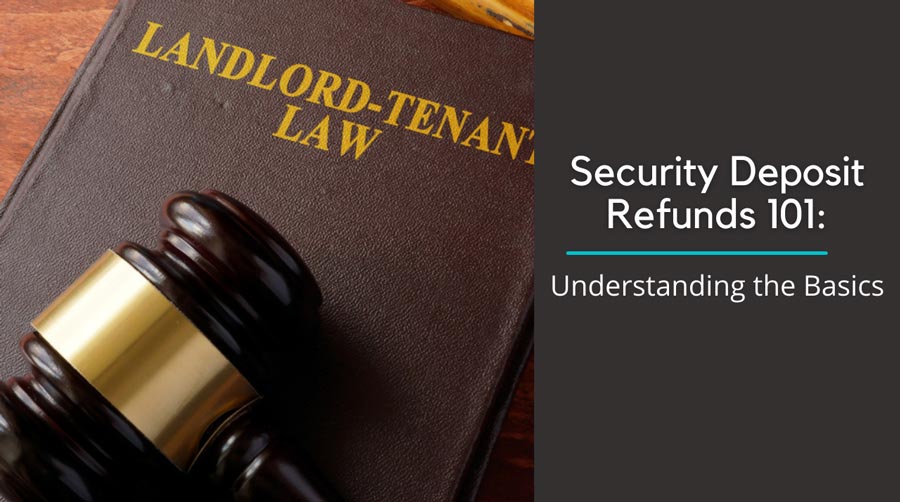
Security Deposit Refunds 101: Understanding the Basics
Before we can address the concern about giving up such a substantial amount, and whether or not we will see it again, we need to ask ourselves, “What is the security deposit really for?” and “Why is it such a big amount?” Even though both questions impact each other, they really have their own specific answer.
What Is A Security Deposit Used For?
The security deposit is defined as fee, payment, or charge, secured at the beginning of the tenancy, to be used towards any balance the resident may owe after they vacate the property.
- This typically is for any incidentals, repairs, or damage to the property, exclusive of ordinary wear and tear.
- This can also be any outstanding default of rent or late fees owed.
- The cleaning of the premises upon termination of tenancy.
- Or to restore, replace or return any personal property or appurtenances obligated under the rental agreement by the tenant.
It should be noted that all security deposits are refundable, in fact, no rental agreement or lease can state that a security deposit is “nonrefundable.” California Civil Code Section 1950.5(m)
How Much Is Required For The Security Deposit?
When it comes to the amount, the reality is that it is determined by the greatest risk of expense left by any resident, essentially “the last month’s rent.”
From the perspective of a Landlord, a resident could end up moving out, leaving several repairs needing to be done, and they may even skip out on the last month’s rent, as well as any other outstanding fees they may have owed.
Before the property could be rented to another resident, the landlord is going to have to make the repairs needed.
If there was also missing rent, the landlord will have fewer funds available to make those repairs. It is for this reason that when most landlords are asked, “What do I need to pay to move into the property?” they respond with, “The first and last month’s rent.”
Does the Law Limit the Amount of Security Deposit which can be demanded or collected?
The California Civil Code gives explicit instruction as to the maximum security amount that can be asked for under 1950.5.(c) “A landlord may not demand or receive security, however, denominated, in an amount or value in excess of an amount equal to two months’ rent, in the case of unfurnished residential property, and an amount equal to three months’ rent, in the case of furnished residential property, in addition to any rent for the first month paid on or before initial occupancy.”
However, this statute gives further guidance stating that it does not prohibit any arrangements between the landlord and resident to pay an advance payment of not less than six months’ rent if the term of the lease is six months or longer. California Civil Code 1950.5.(c)
To summarize here, the landlord can lawfully ask for a security deposit of equal value to two month’s rent, in addition to the first month’s rent, for a total move-in cost of a value equal to three month’s rent.
How Do I Know What I Will Be Charged For From My Security Deposit?
The landlord is required, within a reasonable time after either party gives notice of their intention to terminate the tenancy, or before the end of the lease term, to send a notice to the resident in writing of their option to request an initial inspection as well as their right to be present at the inspection.
The purpose of this inspection is to give the resident an idea of the list of items that the landlord will be requiring to be repaired or cleaned and if they have not been corrected before the resident moves out would otherwise be charged against the security deposit. This means that the resident still has the time to take care of these items so that they can get their full security deposit back, so long as there are no hidden items that could not be seen due to the resident’s personal belongings blocking them from view. This inspection can be scheduled as early as two weeks before the resident moves out, but not any sooner. California Civil Code 1950.5.(f)
How Long Does it Take to Get the Security Back?
Under California law, within 21 calendar days or less after the resident moves out, the landlord must either:
- Send back a full refund of the security deposit, or
- Mail or personally deliver an itemized statement that lists the amounts of any deductions from the security deposit and the reasons for the deductions, together with a refund of any amounts not deducted.
Civil Code Section 1950.5(g)(1).
It should be noted that If a repair to be done by the landlord or the landlord’s employee cannot reasonably be completed within 21 calendar days after the tenant has vacated the premises, or if the documents from a person or entity providing services, materials, or supplies are not in the landlord’s possession within 21 calendar days after the tenant has vacated the premises, the landlord may deduct the amount of a good faith estimate of the charges that will be incurred and provide that estimate with the itemized statement. Civil Code Section 1950.5(g)(3).
Summary
To recap, the landlord can charge up to two month’s equal value of the rent as a security, in addition to the first month’s rent to secure a new tenancy. However, there are several regulations in place to assist the resident in receiving their security deposit back, in full, once they move out. First, all security deposits must potentially be refundable. Second, a landlord has to provide the option of an initial inspection and allow the resident to be present. Third, the resident is allowed to take care of any noted items, of concern, before they vacate. Fourth, any charges are to exclude normal wear and tear. Fifth, the landlord has to provide an itemized list of the repairs and their cost along with any balance of the security deposit to the resident within 21 days after they vacate.
Over the past 30 years, we have had many residents receive their full security deposit back and others have simply elected for a cleaning service to be paid out of their security deposit. That just becomes one less thing they have to worry about on moving day. And while we are allowed 21 days to get the refund out, we are usually able to get the resident their refund within 12days, on average. If you have any questions about our specific policies, please contact us and we would be delighted to review them with you.











